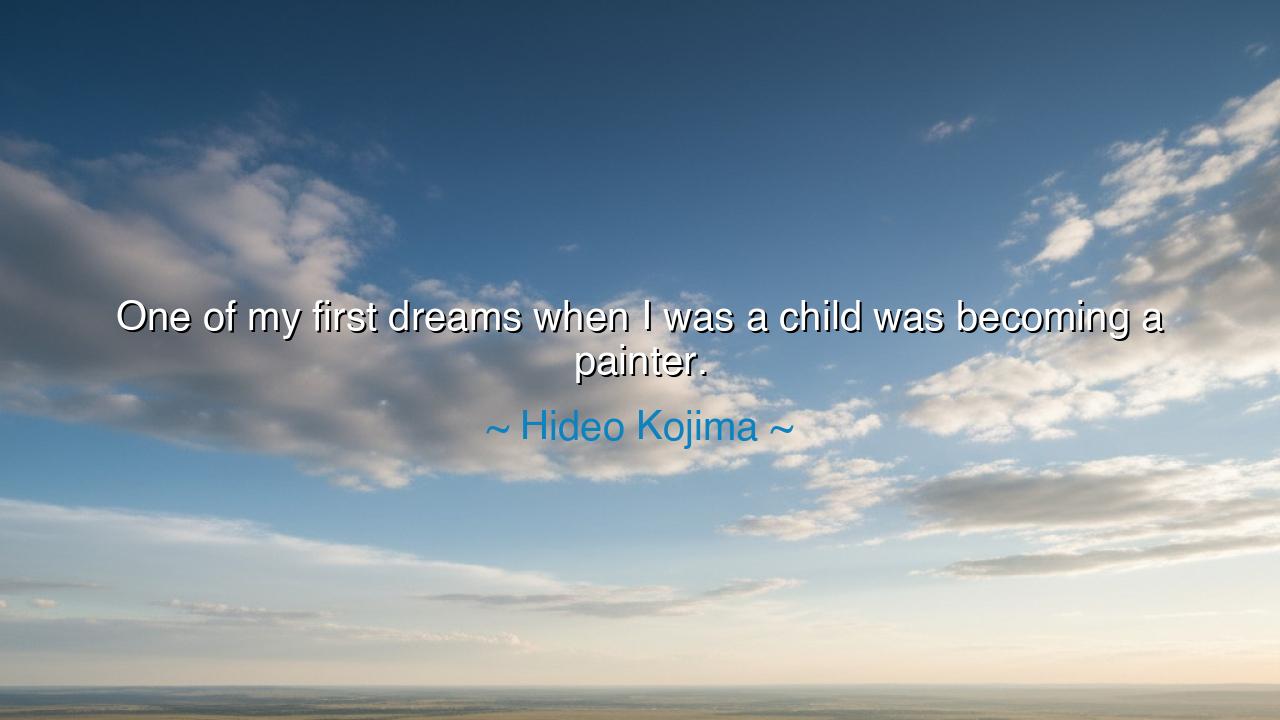
One of my first dreams when I was a child was becoming a painter.






The words of Hideo Kojima, visionary storyteller and creator of worlds, ring with the quiet purity of an artist’s confession: “One of my first dreams when I was a child was becoming a painter.” In this simple utterance, there lies a universe of longing — the innocent spark of a child who gazed upon color, form, and imagination and felt called to create. To dream of becoming a painter is not merely to wish for mastery of brush and pigment; it is to long for communion with the act of creation itself — to give shape to the unseen, to render emotion into form, to bridge the worlds of spirit and reality. In these few words, Kojima reveals the seed from which all his future works would grow: the eternal child who still dreams through art.
Kojima, known to the modern world as the creator of the legendary Metal Gear and Death Stranding, was born not in the halls of art but in the turbulence of postwar Japan — a nation rebuilding itself from ruin, caught between tradition and modernity. Yet even amid the cold machinery of a changing world, the boy within him saw visions — stories, colors, images that spoke louder than the noise of everyday life. His dream of being a painter was not abandoned; it was transformed. The canvas became a screen, the brush became the controller, and the pigments became light and sound. Like the alchemists of old, he did not forsake his dream — he transmuted it into another form. Thus, his words are not nostalgic but triumphant: for though he did not become a painter in name, he fulfilled the essence of the dream through a different art.
In the ancient understanding, to dream of art is to hear the voice of the divine whispering within. The painter, the sculptor, the poet, the creator — all are but vessels for a force greater than themselves, striving to manifest beauty through the hands of mortals. Kojima’s childhood dream reminds us that the truest dreams are not bound to a single path; they are the eternal impulse to create that finds expression in whatever form life allows. The wise know that destiny may alter the road, but never the destination. When the heart’s calling is strong, it finds new instruments, new languages, new shapes — yet the soul behind it remains the same.
Consider the tale of Leonardo da Vinci, who began his life as a painter, yet became an inventor, anatomist, engineer, and dreamer of the skies. His brush gave birth to The Last Supper and Mona Lisa, yet his mind gave birth to the blueprints of a future age. Like Kojima, Leonardo was not confined by the limits of one craft; he saw creation itself as a single, boundless field. To dream as a painter was, for both men, to see the world as a living artwork — where every detail, every idea, every life was a stroke upon the great canvas of existence.
In Kojima’s quote, there also stirs a gentle nostalgia — a remembrance of innocence before the world teaches us to be “practical.” Many dreamers, when young, wish to create: to paint, to write, to sing. But as they grow older, the world urges them to forget. Yet those who, like Kojima, keep even a fragment of that childhood dream alive, often find their greatest strength there. The child’s vision is pure; it is untouched by fear of failure or judgment. To recall one’s first dream is to return to that purity — the wellspring of imagination that nourishes all creativity. Thus, Kojima’s words become a quiet reminder: within every adult lies a child still dreaming, still painting worlds unseen.
The lesson is profound and eternal: never abandon the essence of your first dream, even if its form must change. Life may steer you toward other paths, but the creative fire that once burned in your youth can guide you still — in your work, your relationships, your vision of the world. If you dreamed of painting, then live as one who paints — with care, with color, with attention to beauty. If you dreamed of writing, then speak with poetry, even in daily life. The dream need not remain literal; it must remain alive.
So, O seeker of truth, remember this teaching from Kojima’s quiet revelation: every dream born in childhood is a message from your deeper self — a signpost toward the life your soul wishes to create. Honor it. Return to it when the world grows gray. Whether your canvas is a studio, a workshop, a family, or the vast theater of your own imagination, let the artist within continue to paint. For the dream you once had as a child was not a fleeting wish; it was the voice of destiny, whispering softly of the greatness that could be. And when you follow it, you do not merely live — you create.






AAdministratorAdministrator
Welcome, honored guests. Please leave a comment, we will respond soon